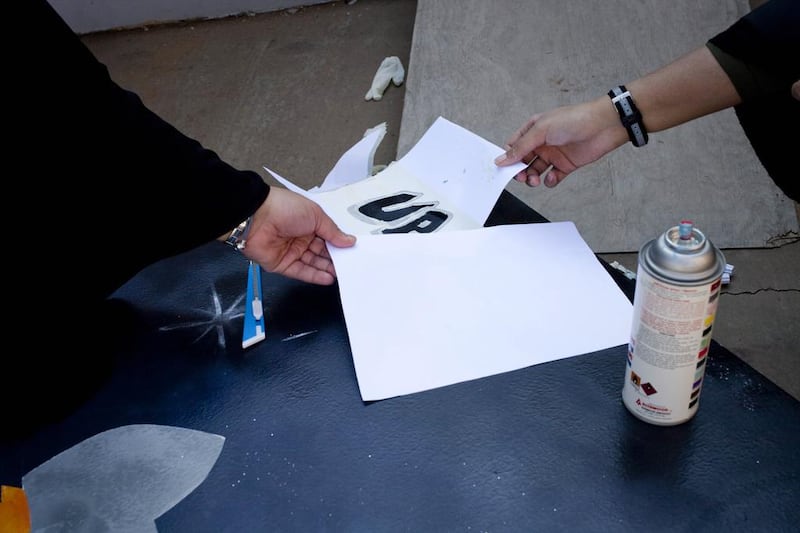Before Asma Al Ghafri and her friends were handed spray cans, they watched videos and looked through images of New York and Brighton, the West Bank Barrier and the Berlin Wall.
Graffiti is usually an outlet for frustrations against a social, economic or political system.
But Ms Al Ghafri and her friends, applied media students at Ras Al Khaimah Women’s College, use it to express solidarity with the Government.
“In some countries it’s effective to put the ideas against the Government, but here it’s effective the other way,” says Ms Al Ghafri. “It’s effective to support the Government, in supporting some ideas that we want.”
This is a class project for National Day, but even in the streets of Karama or the mountains of Wadi Al Baih, graffiti is usually used to express national pride or religious devotion, not dissatisfaction or irreverence.
“It’s a different culture,” says Amna Al Shehhi, 20. “For me, I think it depends on our Government. Our leaders give us everything and we don’t feel angry about them.
“But you know, in other countries when they feel angry about anything they carry spray. Here, it’s illegal to make our wall or street damaged.”
About 50 applied media students have painted 20 posters that will be displayed around the school for National Day. They provide a glimpse into how the women view themselves and their nation.
They show a familiar repertoire of national symbols. Camels and falcons, teacups and sheikhs feature prominently, as does the Burj Khalifa, the Dubai skyline and wind towers, each brilliantly painted in the national colours and the yellow and blues of the desert and sky.
Pointing to stencilled images of the Ruling Sheikhs and founding fathers, the women recount how their parents and grandparents lived in the time of the founding President, Sheikh Zayed, and describe his visits to Ras Al Khaimah after its accession to the union in January 1972.
Personal relationship with Rulers are considered an important part of national identity and celebrations of it.
“Also, our leaders, how they respect us and how we respect them,” says Ms Al Shehhi. “They encourage and support us in every major thing. They help us all the time.”
“You know, most of the new generation, they don’t meet His Highness Sheikh Zayed but they know him in the home environment because our parents talk about him a lot,” says Amna Al Zaabi, 23.
Ties to the federal Government and the capital city are a reality of daily lives, not an abstract ideal.
Most of the men in the students’ families work for the federal Government, in the police or military, and most live in Al Dhait. The desert neighbourhood has rapidly grown with the expansion of the Sheikh Zayed Housing Project, which offers grants and home loans to Emiratis.
“We’re like sisters, nothing different than this,” says Ms Al Ghafri of the different emirates.
Their connection to Dubai is also clear in the posters, which are decorated ed by its skyline and covered in its emblem for the Expo 2020 bid.
Like their art, which ranges from forts to space rockets, the women are a comfortable blend of modernity and tradition.
“Everything is changed,” Ms Al Shehhi says. “The culture is mixed between the past and the present and also we take from the foreign people and also other people take from us.”
One image depicting this blend of cultures shows a woman half-dressed in a traditional kandura with a shayla over her hair, while the other half shows uncovered hair, trousers and a Chanel shirt.
“I don’t like it because the hair is not covered,” Ms Al Shehhi says.
Generations are short and change happens quick.
“You know, every year we feel that there’s a new change, a new thing,” Ms Al Shehhi says.
“A big revolution,” says Shayma Al Naqbi, 19, who wears square, purple, leopard-print glasses and hot-pink nail polish. “I don’t like the change because I feel that in the past, women were more traditional but now only wear jeans and T-shirts and go outside.”
Other girls object when she says she does not like the change.
“In my opinion, it’s a good change – but they have to keep their tradition,” says Mouza Al Zaabi, 20. “They can do both of them.”
All of the young women recognise that 10 years ago, their families would not have supported studies in applied media, which was associated with television.
Acceptance of the liberal arts has grown and support at the college reflects this.
“The thing about the applied media is they can open up their own design companies from home, such as graphic design or interior design, which is why I think it appeals to them as well,” says David Jay, their applied-media instructor.
“Beyond that, its learning for life. Even if they become housewives they can take it on as a hobby, if not as a career. We’ve adopted more liberal studies and it does give them this sort of opportunity.”
At the same time the arts programme has grown, women have also lined up to enrol in engineering courses.
“Here the education is not that old, so they’re not yet fitted into gender-segregated roles,” says Dr Triona Croke, the dean.
“Its not specifically gendered as a male occupation. From day one the education of women was in the constitution and was continuously supported by Sheikh Zayed and Sheikha Fatima [bint Mubarak, wife of the founding President].
“The women here did not have to fight for education. It was given to them.”
Such gifts are cause for celebration, say the women.
“We chose graffiti because it’s a really free way to explain the United Arab Emirates, to make people see how we love the United Arab Emirates,” says Ms Al Ghafri.
“Before, we think it’s very difficult to do but after two days, three days we tried again,” says Ms Al Zaabi. “It’s nice you know. Sometimes we need to change, even in ourselves.”
azacharias@thenational.ae






